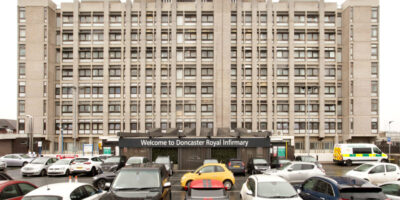 Known as ‘Hospital@’, this innovative system has replaced all non-urgent messages, known as ‘bleeps’, at Doncaster Royal Infirmary and Bassetlaw Hospital in recent weeks. In the past, nurses and other health professionals would contact doctors by ‘bleeping’ them using a telephone to send a message to a pager. A one-way device, the doctor would then have to find a phone, call the number displayed on their pager and finally receive instructions, often regarding patient care and treatment.
Known as ‘Hospital@’, this innovative system has replaced all non-urgent messages, known as ‘bleeps’, at Doncaster Royal Infirmary and Bassetlaw Hospital in recent weeks. In the past, nurses and other health professionals would contact doctors by ‘bleeping’ them using a telephone to send a message to a pager. A one-way device, the doctor would then have to find a phone, call the number displayed on their pager and finally receive instructions, often regarding patient care and treatment.
With around 130,000 pagers still in active use in the NHS, making up around 10% of usage worldwide, the devices were ground breaking upon their introduction and adoption in the 1980s, however as technology has become more sophisticated, they are seen as outdated, inefficient and expensive. According to the Department of Health and Social Care, the use of pagers within the health service costs tax payers around £6.6 million, with only one telecoms provider in the UK still supporting these devices, with each costing around £400.
Outlining the need to move to better ways of working, in early 2019, Matt Hancock, the Secretary for Health and Social Care, asked all trusts within the country to phase out the use of pagers by the end of 2021.
Ensuring they are ahead of the curve, by using Hospital@, clinicians at DBTH now have access to a simple app, available on desktop PCs as well as mobile phones. Colleagues are able to log non-urgent task, which are then sent to doctors’ work phones as an alert. These jobs cover all aspects of non-urgent patient care and treatment, and enable skilled health professionals to deliver high quality care much more efficiently. Once a task is done, they are able to mark it as complete using the app, letting colleagues know so a patient can move to the next stage in their care plan.
Launched within the Trust’s ‘Medicine Division’ which contains such services as the Emergency Department, Acute Medical Unit as well as elderly care wards, in the first three days of implementation, over 370 tasks were completed using the new system, with few issues reported and lots of positive feedback from staff using this new system.
Dr Mike Whiteside, Acute Physician and Chief Clinical Information Officer at DBTH, said: “I want to thank colleagues within the Trust for their support, engagement and willingness to adopt Hospital@ within services throughout our hospitals. Ensuring we make best use of technology to improve patient care is incredibly important and will define our success as a Trust in the years to come, helping us to improve patient care, safety and experience”
First piloted within Bassetlaw Hospital, the Trust will be rolling-out Hospital@, which is developed by Nervecentre, to Montagu Hospital in mid-August.
Richard Parker OBE, Chief Executive, said: “It’s important that we get behind new technology and changes such as this to enable us to provide the safest care and treatment possible for our patients, as well as supporting our vision to become outstanding in all that we do. I want to thank every member of Team DBTH for their support in making the launch of Hospital@ a success and I eagerly await future innovations as we move forward with our Digital Transformation work.”
The launch of Hospital@ forms part of DBTH’s ‘Digital Transformation programme, a scheme of work which is looking at making the most of new technologies in order to improve patient care, safety, experience and treatment.



